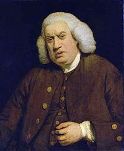 Today is Samuel Johnson’s 300th birthday.
Today is Samuel Johnson’s 300th birthday.
After nine years of work, Samuel Johnson published a major dictionary of English words in 1755. One of the key features of A Dictionary of the English Language was that Dr. Johnson used quotations from books where a particular word was used to illustrate the word’s meaning.
Why should a law school be interested in Samuel Johnson’s dictionary and his 300th birthday? On the way to work this morning, I heard a BBC radio program (aired on NPR) about Dr. Johnson’s dictionary. On that show, the commentators discussed how Dr. Johnson’s dictionary is important to the United States Constitution because it was the dictionary most often used during the time the Constitution was drafted. Jack Lynch also refers to Dr. Johnson’s influence on documents related to the founding of this country in his 2005 New York Times article. For further reading on this topic, Henry Hitching’s book, Dr. Johnson’s Dictionary: The Extraordinary Story of the Book that Defined the World, looks promising.
Does anyone know of examples where legal advocates have cited Dr. Johnson’s dictionary to interpret the law?

I don’t know the answer to your question, but I do know that Johnson is the source of one of my favorite quotes in copyright history:
“No man but a blockhead ever wrote except for money.”
Hi Melissa,
I run The Samuel Johnson Sound Bite Page, and your question seems to easy to answer, I figure I’ll win a free t-shirt, Johnson Pez Dispenser, or something similar.
No? Shucks. OK, here’s the drill:
Since laws are written in a given time period, the interpretation of the laws have to cite the interpretation of the words at the time. Since Johnson’s Dictionary of the English Language was the standard for so many years, until it was replaced by the OED, it’s the source.
No more, no less, and no big deal.
By the way Jack Lynch and I are not related, although we both think it’s a cute coincidence that we share the last name. Hester Thrale Piozzi also has “Lynch” in the longest form of her name.
I too am a fan of Johnson, although he was no fan of the United States. In 1775, he penned a pamphlet, “Taxation: No Tyranny” in which he lambasted the American argument that there was something tyrannical about the taxes imposed by parliament on the North American colonies after the French and Indian War. In a clear reference to Patrick Henry and other belligerent planters in Virginia, he observed, “[H]ow is it that we hear the loudest yelps for liberty among the drivers of negroes?” Ouch. Of course, Johnson lived the last 22 years of his life supported by a pension granted him by King George III, so what should we expect.
Great quote, Bruce, especially because Dr. Johnson apparently experienced poverty at times in his life.
Frank, thanks for sharing your thoughts on Dr. Johnson and your website. Thanks also for mentioning the OED, another magnificent dictionary. Like Dr. Johnson’s dictionary, the OED uses quotations from literature to illustrate the meanings of words. A few years ago, Professor Rebecca Blemberg lent a good book on the history of the OED to me. It’s entitled The Professor and the Madman: A Tale of Murder, Insanity, and the Making of the Oxford English Dictionary, written by Simon Winchester. I highly recommend it.
Finally, I’d like to offer an answer to my own question: Justice Scalia quotes from Dr. Johnson’s definition of “arms” in the analysis of the Second Amendment in District of Columbia v. Heller, __ U.S. __, 128 S.Ct. 2783 (2008).
Dean Kearney quoted one of my favorites from Dr. Johnson during Advanced Civil Procedure class this morning: “Depend upon it, sir, when a man knows he is to be hanged in a fortnight, it concentrates his mind wonderfully.” Every lawyer or law student who has approached a deadline knows the truth of this one.